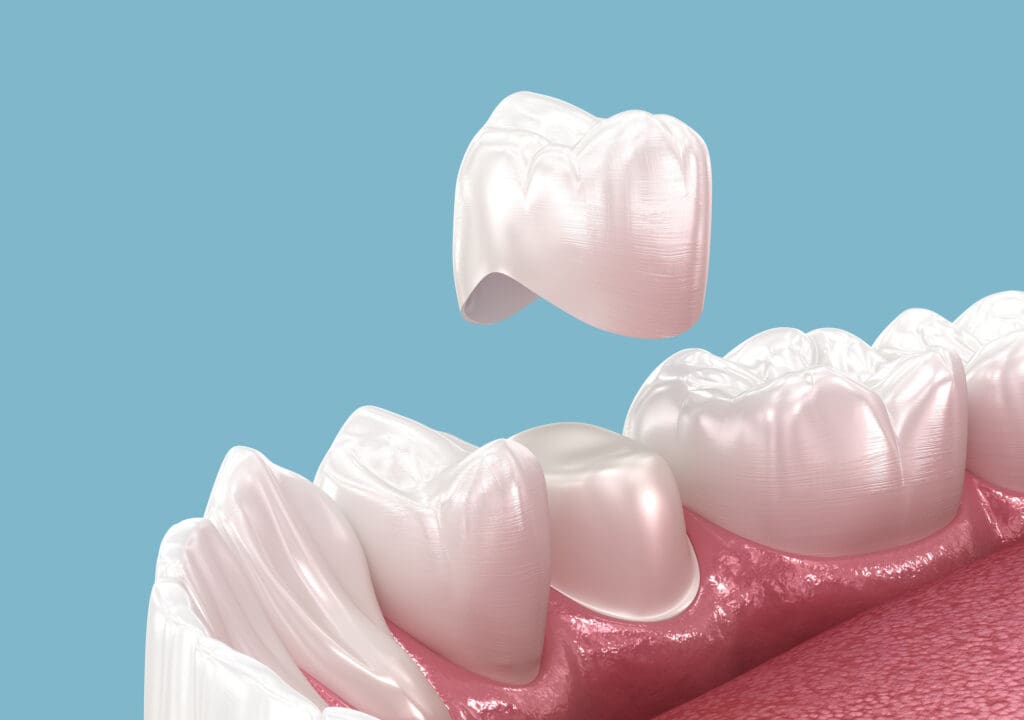Dental crowns are a key part of modern restorative dentistry. They help repair damaged teeth and bring back their function and appearance. Dr. Todd Canatella often uses crowns to fix decay, cracked or chipped teeth, or to complete a dental implant. Crowns are a strong and lasting way to protect and restore teeth as part of our restorative dentistry services.

Dental Crowns in New Orleans, LA
A dental crown is a cap that covers a damaged tooth. It restores the tooth’s size, shape, and strength while also improving its look. Crowns can be used for several reasons:
- Protect a weak tooth from breaking
- Restore a broken or worn-down tooth
- Cover and support a tooth with a large filling
- Hold a dental bridge in place
- Cover misshapen or discolored teeth
- Complete a dental implant
Crowns are not just about appearance, they protect your oral health. A damaged tooth is more likely to develop problems like infections or even tooth loss. Crowns act as a shield to keep your tooth safe and in place. They also help making chewing and speaking easier.
By covering imperfections like stains or uneven shapes, crowns can also boost your confidence. They give your teeth a smooth look to help you feel good about your smile.
Types of Dental Crowns
Each crown a dentist offers consists of specific materials for the case. The type you choose will depend on your needs and preferences.
- Metal Crowns: These are the most durable and rarely chip or break. They can handle strong chewing forces because they consist of metals like gold, nickel, or chromium. However, their metallic color makes them less popular for visible teeth.
- Porcelain-Fused-to-Metal Crowns: These combine the strength of metal with the natural look of porcelain. While the metal provides strength, the porcelain layer can chip or wear over time.
- All-Ceramic or All-Porcelain Crowns: These offer the best color match to your teeth and are ideal for patients with metal allergies. However, they’re not as strong as metal-based crowns.
- Resin Crowns: These are a more affordable option, but they wear down faster and are more likely to break.
Choosing the right crown depends on factors like where the tooth is located, and how much of your natural tooth is left. Metal crowns are great for back teeth because they can handle heavy chewing. All-ceramic crowns are ideal for front teeth because of their natural look. Resin crowns work well if you’re on a budget, but they may not last as long.
The Dental Crowns Process
Getting a crown usually takes two visits. During the first visit, Dr. Canatella will check the tooth and prepare it. He may preform a root canal first to treat decay or infection, and then clean the tooth.
Once the tooth is ready, the dentist shapes it so the crown fits perfectly. We then take an impression of your tooth to create the custom crown. He may place a temporary crown to protect your tooth while the permanent one is being made.
At the second visit, we will remove the temporary crown. We will check how the permanent one fits and make sure the color is right. If everything looks good, Dr. Canatella will cement the crown in place. This process needs careful attention to ensure the crown feels comfortable and works well with your natural teeth.
Caring for Dental Crowns
With the right care, dental crowns can last for many years. Here’s how to keep them in good shape:
- Brush your teeth twice a day with fluoride toothpaste.
- Floss daily to remove plaque and food particles.
- Avoid biting hard foods like ice or candy to prevent damage.
- Visit the dentist regularly for cleanings and check-ups.
Ask about getting a night guard if you grind your teeth at night. This can protect both your crown and your natural teeth. Regular dental visits are also important. During these check-ups, Dr. Canatella can check your crown and make sure everything is in good condition.
By following these steps, you can help your dental crown stay strong and keep your smile healthy. Canatella Dental is your trusted dental practice in New Orleans, serving Lakeview, Mid-city, Gentilly and beyond. Give us a call at 504-282-0700 today.
